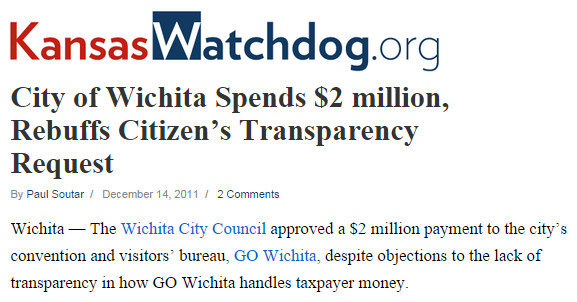Boosters of the proposed Wichita sales tax promise transparency. But Wichita has not delivered on that in the past, and still rebuffs the public’s right to know.
When a city council member apologizes to bureaucrats because they have to defend why their agencies won’t disclose how taxpayer money is spent, we have a problem. When the mayor and most other council members agree, the problem is compounded. Carl Brewer won’t be mayor past April, but the city council member that apologized to bureaucrats — Pete Meitzner (district 2, east Wichita) — may continue serving in city government beyond next year’s elections. Wichita City Manager Robert Layton will likely continue serving for the foreseeable future.
Wichita City Council Member Pete Meitzner does not support the public’s right to know how taxpayer funds are spent.
Why is this important? Supporters of the proposed Wichita sales tax promise transparency in operations and spending, especially regarding the jobs fund. But requests for spending records by the city’s quasi-governmental agencies are routinely rebuffed. Simple requests for contracts without outside entities are rejected. The city supports this refusal to comply with the Kansas Open Records Act.
Here are some things voters may want to consider as they evaluate promises of future transparency and accountability:
- Many of the people presently in charge at city hall and at agencies like Greater Wichita Economic Development Coalition will still be in charge if the proposed sales tax passes.
- The city council seems pleased with city manager Robert Layton. He has not advocated for citizens’ right to know how taxpayer money is spent despite being presented with compelling reasons why the city should act to increase transparency.
- The Kansas Open Records Act does not prohibit the city and these agencies from releasing spending records. The city and agencies have made this decision, and have spent taxpayer resources fighting against the release of spending records.
- If the city and its quasi-governmental agencies are serious about accountability and transparency, they could release the requested records today.
- The city is unable to provide spending records in computer-readable form except for images. This data is not readily usable.
- One of the co-chairs of the “Yes Wichita” group, Harvey Sorensen, has been a vigorous defender of government’s ability to spend taxpayer funds in secret, telling the city council that advocates for transparency simply want to embarrass the city, and there is no public purpose for their requests.
Given this background, on what basis do we believe that the city and its agencies will change their attitude towards citizens’ right to know how taxpayer funds are spent?
If the city wants to convince citizens that it has changed its attitude towards government transparency and citizens’ right to know how tax money is spent, it could positively respond to the records requests made by myself and Kansas Policy Institute.
Following, from December 2012, an illustration of the city’s attitude towards citizens’ right to know.
Wichita, again, fails at open government
The Wichita City Council, when presented with an opportunity to increase the ability of citizens to observe the workings of the government they pay for, decided against the cause of open government, preferring to keep the spending of taxpayer money a secret.
The occasion was consideration of renewing its contract with Go Wichita Convention and Visitors Bureau. I asked, as I have in the past for this agency and also for Wichita Downtown Development Corporation and Greater Wichita Economic Development Coalition, that they consider themselves to be what they are: public agencies as defined in the Kansas Open Records Act.
In the past I’ve argued that Go Wichita is a public agency as defined in the Kansas Open Records Act. But the city disagreed. And astonishingly, the Sedgwick County District Attorney agrees with the city’s interpretation of the law.
So I asked that we put aside the law for now, and instead talk about good public policy. Let’s recognize that even if the law does not require Go Wichita, WDDC, and GWEDC to disclose records, the law does not prohibit them from fulfilling records requests.
Once we understand this, we’re left with these questions:
Why does Go Wichita, an agency funded almost totally by tax revenue, want to keep secret how it spends that money, over $2 million per year?
Why is this city council satisfied with this lack of disclosure of how taxpayer funds are spent?
Why isn’t Go Wichita’s check register readily available online, as it is for Sedgwick County?
For that matter, why isn’t Wichita’s check register online?
It would be a simple matter for the council to declare that the city and its taxpayer-funded partner agencies believe in open government. All the city has to have is the will to do this. It takes nothing more.
Only Wichita City Council Member Michael O’Donnell (district 4, south and southwest Wichita) gets it, and yesterday was his last meeting as a member of the council. No other council members would speak up in favor of citizens’ right to open government.
But it’s much worse than a simple failure to recognize the importance of open government. Now we have additional confirmation of what we already suspected: Many members of the Wichita City Council are openly hostile towards citizens’ right to know.
In his remarks, Wichita City Council Member Pete Meitzner (district 2, east Wichita) apologized to the Go Wichita President that she had become “a pawn in the policy game.” He said it was “incredibly unfair that you get drawn into something like this.”
He added that this is a matter for the Attorney General and the District Attorney, and that not being a lawyer, she shouldn’t be expected to understand these issues. He repeated the pawn theme, saying “Unfortunately there are occasions where some people want to use great people like yourself and [Wichita Downtown Development Corporation President] Jeff Fluhr as pawns in a very tumultuous environment. Please don’t be deterred by that.”
Mayor Brewer added “I would have to say Pete pretty much said it all.”
We’ve learned that city council members rely on — as Randy Brown told the council last year — facile legal reasoning to avoid oversight: “It may not be the obligation of the City of Wichita to enforce the Kansas Open Records Act legally, but certainly morally you guys have that obligation. To keep something cloudy when it should be transparent I think is foolishness on the part of any public body, and a slap in the face of the citizens of Kansas. By every definition that we’ve discovered, organizations such as Go Wichita are subject to the Kansas Open Records Act.”
But by framing open government as a legal issue — one that only lawyers can understand and decide — Wichita city government attempts to avoid criticism for their attitude towards citizens.
It’s especially absurd for this reason: Even if we accept the city’s legal position that the city and its quasi-governmental taxpayer-funded are not required to fulfill records request, there’s nothing preventing from doing that — if they wanted to.
In some ways, I understand the mayor, council members, and bureaucrats. Who wants to operate under increased oversight?
What I don’t understand is the Wichita news media’s lack of interest in this matter. Representatives of all major outlets were present at the meeting.
I also don’t understand what Council Member Lavonta Williams (district 1, northeast Wichita) suggested I do: “schmooze” with staff before asking for records. (That’s not my word, but a characterization of Williams’ suggestion made by another observer.)
I and others who have made records requests of these quasi-governmental taxpayer-funded organizations have alleged no wrongdoing by them. But at some point, citizens will be justified in wondering whether there is something that needs to be kept secret.
The actions of this city have been noticed by the Kansas Legislature. The city’s refusal to ask its tax-funded partners to recognize they are public agencies as defined in the Kansas Open Records Act is the impetus for corrective legislation that may be considered this year.
Don’t let this new law be known as the “Wichita law.” Let’s not make Wichita an example for government secrecy over citizens’ right to know.
Unfortunately, that bad example has already been set, led by the city’s mayor and city council.

 These agencies spend considerable sums of tax money. This week the city will consider funding Go Wichita with a budget of $2,356,851 for 2015. That is not all the taxpayer money this agency will spend, as earlier this year the council voted to increase the city’s hotel tax by 2.75 cents per dollar, with the proceeds going to Go Wichita. City documents indicate that tax is estimated to generate $2.3 million per year.
These agencies spend considerable sums of tax money. This week the city will consider funding Go Wichita with a budget of $2,356,851 for 2015. That is not all the taxpayer money this agency will spend, as earlier this year the council voted to increase the city’s hotel tax by 2.75 cents per dollar, with the proceeds going to Go Wichita. City documents indicate that tax is estimated to generate $2.3 million per year.








 One might have thought that the city was keeping records on the number of jobs created on at least an annual basis for management purposes, and would have these figures ready for immediate review. But apparently that isn’t the case.
One might have thought that the city was keeping records on the number of jobs created on at least an annual basis for management purposes, and would have these figures ready for immediate review. But apparently that isn’t the case.

 item had been “discussed in length last week,” referring to what would be the June 10, 2014 meeting. A reading of council agendas and minutes shows that it was actually at the June 3 meeting when the item was presented. Further, the June 3 matter was a different item. It’s a small detail, but the purpose of the June 3 item was to approve and accept the property owners petition and set the date for a public hearing. That public hearing was held on June 17.
item had been “discussed in length last week,” referring to what would be the June 10, 2014 meeting. A reading of council agendas and minutes shows that it was actually at the June 3 meeting when the item was presented. Further, the June 3 matter was a different item. It’s a small detail, but the purpose of the June 3 item was to approve and accept the property owners petition and set the date for a public hearing. That public hearing was held on June 17. why is the gap analysis needed for this project and not for others. The assistant city manager explained that it is required for economic development projects like the one under consideration today, but not for others.
why is the gap analysis needed for this project and not for others. The assistant city manager explained that it is required for economic development projects like the one under consideration today, but not for others.